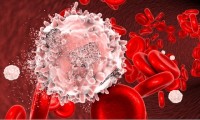-
FDA grants second orphan drug designation to Priothera’s mocravimod
- Source: drugdu
- 216
- November 29, 2023
-
Heat shock protein protects bacteria from plasma treatment
- Source: drugdu
- 106
- November 27, 2023
-
Simcere and Connect sign licensing agreement for anti IL-4Rα AD drug
- Source: drugdu
- 190
- November 26, 2023
-
EirGenix and Sandoz win EU approval for Herceptin biosimilar
- Source: drugdu
- 178
- November 26, 2023
-
Darzalex Faspro in Multiple Myeloma, Imbruvica-Venclexta in Mantle Cell Lymphoma
- Source: drugdu
- 121
- November 25, 2023
-
Boehringer Ingelheim to acquire T3 Pharmaceuticals in deal worth over $500m
- Source: drugdu
- 106
- November 25, 2023
-
Merck to acquire Caraway Therapeutics in a deal worth up to $610m
- Source: drugdu
- 230
- November 25, 2023
-
InDex Scraps Phase III Ulcerative Colitis Trial on Disappointing Data
- Source: drugdu
- 144
- November 24, 2023
-
Q&A With William Ho, CEO of IN8bio
- Source: drugdu
- 104
- November 22, 2023
-
Merck Expands Keytruda’s Label as a First-Line Option for Gastric Cancer
- Source: drugdu
- 101
- November 21, 2023
your submission has already been received.
OK
Subscribe
Please enter a valid Email address!
Submit
The most relevant industry news & insight will be sent to you every two weeks.













